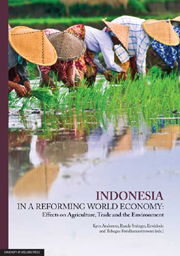Book contents
- Frontmatter
- Contents
- List of tables, figures and boxes
- FIGURES
- Acronyms
- Preface
- List of contributors
- 1 Introduction
- 2 Effects of growth, its interruption, and the Uruguay Round on Indonesian agriculture
- 3 Effects of AFTA and APEC trade policy reforms on Indonesian agriculture
- 4 Trade liberalisation and soil degradation in Indonesia
- 5 Will the Uruguay Round and APEC reforms harm air and water quality in Indonesia?
- 6 Impacts of agricultural protection growth at home and the WTO's Doha Round on Indonesian agriculture
- 7 Effects of agricultural policy reform on household and regional income distribution in Indonesia
- 8 Effects of farm policy reform on Indonesia's secondary food crops
- 9 Effects of agricultural policy reform in Indonesia on its food security and environment
- 10 Impacts of trade policy reform on income distribution and poverty in Indonesia
- APPENDIX 1 The WAYANG Model of the Indonesian economy
- APPENDIX 2 The GTAP Model and database
9 - Effects of agricultural policy reform in Indonesia on its food security and environment
Published online by Cambridge University Press: 05 June 2012
- Frontmatter
- Contents
- List of tables, figures and boxes
- FIGURES
- Acronyms
- Preface
- List of contributors
- 1 Introduction
- 2 Effects of growth, its interruption, and the Uruguay Round on Indonesian agriculture
- 3 Effects of AFTA and APEC trade policy reforms on Indonesian agriculture
- 4 Trade liberalisation and soil degradation in Indonesia
- 5 Will the Uruguay Round and APEC reforms harm air and water quality in Indonesia?
- 6 Impacts of agricultural protection growth at home and the WTO's Doha Round on Indonesian agriculture
- 7 Effects of agricultural policy reform on household and regional income distribution in Indonesia
- 8 Effects of farm policy reform on Indonesia's secondary food crops
- 9 Effects of agricultural policy reform in Indonesia on its food security and environment
- 10 Impacts of trade policy reform on income distribution and poverty in Indonesia
- APPENDIX 1 The WAYANG Model of the Indonesian economy
- APPENDIX 2 The GTAP Model and database
Summary
The ongoing socioeconomic crisis enveloping Indonesia has dramatically reversed decades of rapid economic growth, steady progress in poverty reduction, and substantial improvements in food security. Before the crisis, Indonesia was frequently cited as one of the highest performing Asian economies with per capita GDP growth in the top 10 percent of all developing countries. Since the crisis began in August 1997, however, the rupiah's value dropped by as much as 80 percent before a partial recovery. In 1998, inflation soared to an estimated 100 percent; and GDP fell by an estimated 14 percent in 1998 (World Bank, 1998). Indonesia's poor are especially vulnerable to the falling incomes, increasing prices and rising unemployment and underemployment brought on by these crisisinduced events. World Bank simulations suggest a 12 percent decline in real GDP in 1998 would add some 9 million people to the more than 20 million living in poverty before the crisis began (World Bank, 1998).
Indonesia's capacity to address the crisis initially was complicated by forest fires, drought, floods and a sharp decline in crude oil prices. During 1997, one million hectares of forest fires in Kalimantan and Sumatra damaged ecosystems, destroyed crops, disrupted transport and tourism, increased the incidence of respiratory problems and strained Indonesia's relations with neighbouring Singapore and Malaysia (Solahuddin, 1998). Estimates of the economic damage to Indonesia's logging and timber industries (excluding environmental and health costs) are set at more than US$900 million (Tay, 1998).
- Type
- Chapter
- Information
- Indonesia in a Reforming World EconomyEffects on Agriculture, Trade and the Environment, pp. 179 - 205Publisher: The University of Adelaide PressPrint publication year: 2009



